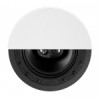Definitive Technology DI 6.5STR DI Series Manual - Page 4
Aiming the Tweeter, Environmental EQ, Installation - di 6 5s
 |
View all Definitive Technology DI 6.5STR manuals
Add to My Manuals
Save this manual to your list of manuals |
Page 4 highlights
Figure 5 Point tweeter in desired direction by turning the tweeter assembly. Di SERIES OWNER'S MANUAL Environmental EQ (not included on Di 3.5R and Di 4.5R models) If your listening room is very reflective, with smooth sheetrock walls, hardwood floors, and non-cushioned furniture, the sound will be overly "bright" and unnatural. Engaging the Environmental EQ feature [Figure 7] (by selecting the "-" setting) compensates for the effect of overly loud treble. If your room is has a lot of absorbing surfaces such as over-stuffed furniture, heavy drapes and rugs such that the speakers sound "dull," engage the "+" setting to boost treble response. Leave the switch in the center position in rooms with a balance of reflecting and absorbing surfaces (most rooms fall into this category). Note: the Di 6.5STR has a two position switch; the minus symbol "-" represents normal treble output and the plus symbol "+" represents treble boost. Figure 6a Push gently in direction of arrow to set angle. Figure 6b Aiming the Tweeter A tweeter aimed toward your listening position improves imaging and detail. To aim the tweeter, first install the speaker in the desired location. Rotate the tweeter so that the arrow on the tweeter faceplate is pointing in the direction you wish to aim the tweeter [Figure 5] then gently push the tweeter in that direction [Figure 6]. When using Di Series In-Wall Loudspeakers as front/main home theater speakers or as stereo speakers in a distributed audio system aim the tweeter toward the main listening position. For rear/surround speakers installed in walls or ceilings, aim the tweeter toward the nearest reflecting surface (an adjacent wall or ceiling) for a more diffuse sound field (if you so desire; for more direct sound, aim the tweeters at your listening position). 4 Installation Figure 7 Installation Cautions Installation of Disappearing Series Loudspeakers requires skills in using tools such as a drill, screwdriver, saws and power tools. Installation also entails running wires through walls. You should have a thorough understanding of local building and fire codes and a familiarity with the area behind the wall or ceiling into which you plan to install your speakers. When cutting holes in and running wires through walls/ceilings you run the risk of cutting electrical wires or water pipes thereby causing safety hazards and property damage. If you are in any doubt that you possess the necessary skills or tools, contact your Definitive Technology dealer, general contractor or a professional installer. Required Tools • Pencil for marking the location of installation. • Bubble level (for Di 5.5S and Di 6.5S models only) • Keyhole saw, utility knife or material- appropriate incising implement for cutting drywall or other wall material. • Phillips head screwdriver. • Power drill with appropriate bit (optional, for starting wall cut). Installation Procedure • You must first install speaker wires that meet appropriate building and fire codes before installing the speakers. Use at least 18 gauge wire or heavier to ensure optimum sound quality.











